[Editor’s Note: Mad Scientist Laboratory welcomes today’s guest blogger, Michael Lortz, contractor, analyst, trainer and writer, with a most perceptive submission proposing a new curriculum for developing talent to analyze twenty-first century conflicts spanning the traditional Elements of National Power (Diplomacy, Information, Military, and Economic), plus Cyber. Using a novel construct derived from a venerable kung-fu classic from the 1970s(!), Mr. Lortz’s innovative concept could well provide future cohorts of analysts with the requisite breadth and depth of knowledge and expertise to contend with the rapidly evolving Operational Environment and the changing character of warfare — Read on!]
There is no doubt conflict is more complex than ever. Although the basics are still the same and man is still man – still driven to conflict by the same factors that drove him to war thousands of years ago – the continued development of technology, systems, and social processes have made conflict continuously complex.
The complexity of modern conflict, especially on a geopolitical scale, forces those who study it to constantly re-evaluate its causes, re-explore its methodologies, and re-strategize options to mitigate it.
While grand conflict has evolved, other conflict has remained stunningly basic. Technology has opened doors to more expansive, more explosive threats to human kind, yet bare knuckle, man-on-man or woman-on-woman fights still remain. In his seminal work, Man, The State, and War, Kenneth Waltz reviewed social conflicts and categorized them into three levels: individual, state, and international.1 Understanding how conflict changes across these levels is important as we look at various modes of conflict.
In 1978, the legendary Shaw Brothers Studio released the kung-fu classic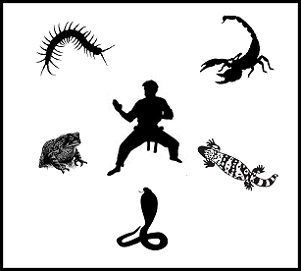 5 Deadly Venoms. In the movie, five kung-fu students are each trained on a unique style: centipede, snake, scorpion, lizard, and toad.2 After training the five students, the master trains a sixth student in knowledge and understanding of the five styles, their weaknesses and their strengths, but the master does not teach the sixth to the depth of the five masters’ individual skill.
5 Deadly Venoms. In the movie, five kung-fu students are each trained on a unique style: centipede, snake, scorpion, lizard, and toad.2 After training the five students, the master trains a sixth student in knowledge and understanding of the five styles, their weaknesses and their strengths, but the master does not teach the sixth to the depth of the five masters’ individual skill.
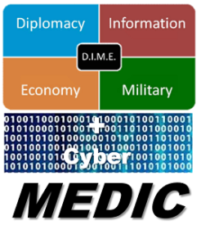 Fans of the movie have labelled the sixth master “The Hybrid Venom.” The analogy of the kung-fu classic fits perfectly with how we should train analysts. In our case, the Five Platforms of Conflict are analogous to the Elements of National Power (Diplomacy, Information, Military, and Economic) with the addition of Cyber power, spelling out DIME-C or MEDIC.
Fans of the movie have labelled the sixth master “The Hybrid Venom.” The analogy of the kung-fu classic fits perfectly with how we should train analysts. In our case, the Five Platforms of Conflict are analogous to the Elements of National Power (Diplomacy, Information, Military, and Economic) with the addition of Cyber power, spelling out DIME-C or MEDIC.
Actors, from nation-states to corporations to individuals, must always be prepared for actions that may disrupt the status quo in their environment. Good preparation requires knowledge and continuous learning and understanding. Understanding the environment is even more important as the target set for international conflict expands to corporations and social infrastructure. A well-trained Hybrid Analyst can apply their knowledge to government or the private sector.
 Instead of the Hybrid Venom, a Hybrid Analyst would be a “jack of all conflicts, master of none.” The masters would be the subject matter experts – in Military, Economic, Diplomatic, Information, and Cyber (MEDIC) conflicts. Hybrid Analysts would understand the vocabulary and issues of the masters enough to connect the dots. A well-trained Hybrid Analyst would look at conflict holistically.
Instead of the Hybrid Venom, a Hybrid Analyst would be a “jack of all conflicts, master of none.” The masters would be the subject matter experts – in Military, Economic, Diplomatic, Information, and Cyber (MEDIC) conflicts. Hybrid Analysts would understand the vocabulary and issues of the masters enough to connect the dots. A well-trained Hybrid Analyst would look at conflict holistically.
Unfortunately, Hybrid Analysts take years to train. But in order to train for a complex conflict, we have to start somewhere. Since 9/11, many universities have offered courses in basic intelligence tradecraft.3 These courses are usually military and politically focused, devoid of the other platforms of conflict. Students need to take courses in Business Strategy, Communications, or Computer Science to understand the remaining platforms of conflict. A better model would teach students the groundwork for all modern conflict and how to analyze the actions of actors on each platform.
The following is a summary of an eight course program designed to teach Basic Hybrid Analysis. This program also lays out a path to Hybrid Analyst specialization, a focus that would be not be considered a specified expert, but would be far above novice analyst.
Course 1 – Analysis Basics
 Course 1 of the Hybrid Analyst Program would teach students the concept of critical thinking, how to think critically, and the Intelligence Cycle. Students would also learn basic analyst tools such as SWOT,4 Porter’s Five Forces,5 Win/Loss Analysis,6 Competitor Analysis,7 and other tools taught by respected analysis instructors. Lastly, students will learn the difference between Policy, Vision, Strategy, Operations, and Tactics and how analysis requirements are different for each.
Course 1 of the Hybrid Analyst Program would teach students the concept of critical thinking, how to think critically, and the Intelligence Cycle. Students would also learn basic analyst tools such as SWOT,4 Porter’s Five Forces,5 Win/Loss Analysis,6 Competitor Analysis,7 and other tools taught by respected analysis instructors. Lastly, students will learn the difference between Policy, Vision, Strategy, Operations, and Tactics and how analysis requirements are different for each.
Course 2 – Threat Analysis
 The second course aspiring Hybrid Analysts would take is Threats and Threat Analysis. This course focuses on the threat modelling of the previous course but also dives into case studies and real world examples of threat detection or lack thereof. Students in this course would also be introduced to entity divisions such as nation-states, non-state actors, corporations, non-government organizations, and individuals. Discussions of political theories such as Realism, Nationalism, and Liberalism could also be taught in this course.
The second course aspiring Hybrid Analysts would take is Threats and Threat Analysis. This course focuses on the threat modelling of the previous course but also dives into case studies and real world examples of threat detection or lack thereof. Students in this course would also be introduced to entity divisions such as nation-states, non-state actors, corporations, non-government organizations, and individuals. Discussions of political theories such as Realism, Nationalism, and Liberalism could also be taught in this course.
Course 3 – Platforms of Conflict and the MEDIC Model
 The third Hybrid Analyst course would introduce the MEDIC model and the Platforms of Conflict introduced in this essay. Students should learn the top issues in each platform and how anarchy as well as treaties, regulations, and agreements affect each platform. Students should also have an understanding of the thought leaders on each platform and their strengths and weaknesses. Lastly, threat discussion from Course 2 will be integrated as well.
The third Hybrid Analyst course would introduce the MEDIC model and the Platforms of Conflict introduced in this essay. Students should learn the top issues in each platform and how anarchy as well as treaties, regulations, and agreements affect each platform. Students should also have an understanding of the thought leaders on each platform and their strengths and weaknesses. Lastly, threat discussion from Course 2 will be integrated as well.
Courses 4, 5, 6, 7, 8 – Conflict on Each Platform
 Hybrid Analyst Courses 4, 5, 6, 7, and 8 each focus on conflict on an individual MEDIC platform. By the end of the courses, Hybrid Analysts will be able to identify the similarities and differences between military, economic, diplomatic, information, and cyber conflicts. They should be familiar with Irregular Warfare, Sanctions, Protests, Propaganda, and Denial of Service Attacks and how these tactics can form a synergy in modern conflict.
Hybrid Analyst Courses 4, 5, 6, 7, and 8 each focus on conflict on an individual MEDIC platform. By the end of the courses, Hybrid Analysts will be able to identify the similarities and differences between military, economic, diplomatic, information, and cyber conflicts. They should be familiar with Irregular Warfare, Sanctions, Protests, Propaganda, and Denial of Service Attacks and how these tactics can form a synergy in modern conflict.
Courses 9-11 – Platform Specialization
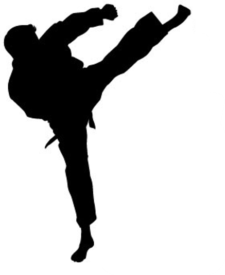 After the 8th course, Hybrid Analysts will be required to select a MEDIC platform on which to specify. Specialization involves completion of three additional courses on one of the platforms. Completion of courses 9 through 11 grants the student the title of “Basic Hybrid Analyst with a focus on (platform)”. Courses 9 through 11 will also train students for any required professional certifications, such as Security+, A+, and Network+ for the Cyber Platform and Association of Certified Anti-Money Laundering Specialists certification for the Economic Platform. The goal of these courses is to get analysts employable as soon as possible.
After the 8th course, Hybrid Analysts will be required to select a MEDIC platform on which to specify. Specialization involves completion of three additional courses on one of the platforms. Completion of courses 9 through 11 grants the student the title of “Basic Hybrid Analyst with a focus on (platform)”. Courses 9 through 11 will also train students for any required professional certifications, such as Security+, A+, and Network+ for the Cyber Platform and Association of Certified Anti-Money Laundering Specialists certification for the Economic Platform. The goal of these courses is to get analysts employable as soon as possible.
 As they progress in their careers, Hybrid Analysts can grow both horizontally and vertically. They can either take classes in other platforms, possibly complete another basic-level focus, or they can go deeper into their platform. As three courses provide Basic certification, six courses on a specific platform would grant Senior-level certification, and 10 courses would endow a Master’s level certification.
As they progress in their careers, Hybrid Analysts can grow both horizontally and vertically. They can either take classes in other platforms, possibly complete another basic-level focus, or they can go deeper into their platform. As three courses provide Basic certification, six courses on a specific platform would grant Senior-level certification, and 10 courses would endow a Master’s level certification.
A total of 50 courses could be taken, and a student could be a Master’s level Hybrid Analyst in all five platforms, however this should be highly discouraged until a student has career experience.
Here we should note that these courses are not geographically bound, meaning they teach about conflicts in various nations, but do not deep-dive into the social sciences such as history, culture, or social makeup. Geographic social experts should still be consulted whenever needed.
There is a huge need for analytic skills in both the government and private sector.8 The growth of data and depth of information requires people who can ask the right questions, find answers, incorporate answers with other answers, and present the situation to leadership. While these soft skills are great, equally important is the focus of knowledge and how it integrates with other fields of knowledge.
Analysts trained in various platforms will not only be more valuable to organizations, but also have more career flexibility, able to increase their value from organization to organization. They will speak the language and understand the current trends and issues of several fields.
Conflict is eternal. Rapid innovation and technological growth has lowered the barriers of entry and made conflict low-cost and high impact. Innovation has not only disrupted markets but it has increased anarchy worldwide. Political immaturity, diminishing natural resources, and increases in inequality have also added to social stresses and the potential for conflict on every level, from individual to international. Rarely in human history have so many people been threatened by so many types of conflict.
Hybrid Analysts may not be able to solve the world’s conflicts, but they will be able to see the big picture and put the pieces together for policy makers and visionaries so they can keep their organizations prosperous.
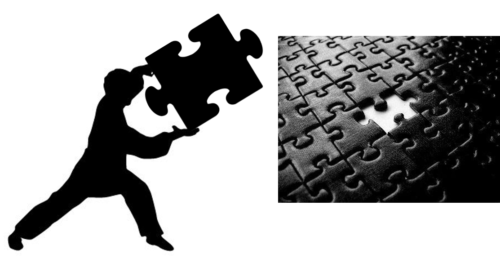
If you enjoyed this post, check out the comprehensive proposal from which it was excerpted here, then explore the following related content on talent management:
The Future of Learning: Personalized, Continuous, and Accelerated
Going on the Offensive in the Fight for the Future, and the associated podcast
The Convergence: The Future of Talent and Soldiers with MAJ Delaney Brown, CPT Jay Long, and 1LT Richard Kuzma, and the associated podcast
Young Minds on Competition and Conflict
New Skills Required to Compete & Win in the Future Operational Environment
Michael Lortz is an analyst, trainer, and writer. He has provided insight for business and government clients at international, state, and local levels. He has studied threats, market competition, and business processes. He holds an MBA, an MA in International Affairs, and a BA in Creative Writing. He is currently working as a contractor in Tampa, Florida.
Disclaimer: The views expressed in this blog post do not necessarily reflect those of the Department of Defense, Department of the Army, Army Futures Command (AFC), or Training and Doctrine Command (TRADOC).
1 https://cup.columbia.edu/book/man-the-state-and-war/9780231125376
2 https://www.youtube.com/watch?v=kX6EHqcvqyo
3 http://scholarcommons.usf.edu/cgi/viewcontent.cgi?article=1459&context=jss
4 https://www.investopedia.com/terms/s/swot.asp
5 https://www.investopedia.com/terms/p/porter.asp
6 https://labs.openviewpartners.com/how-to-conduct-win-loss-analysis/#.WwyH0-6FPIU
7 https://books.google.com.qa/books?id=hzN3L5Z3JNsC&pg=PA23&hl=ar&source=gbs_toc_r&cad=3#v=onepage&q&f=false
8 http://projectmanagementhacks.com/why-you-need-better-analytical-skills/
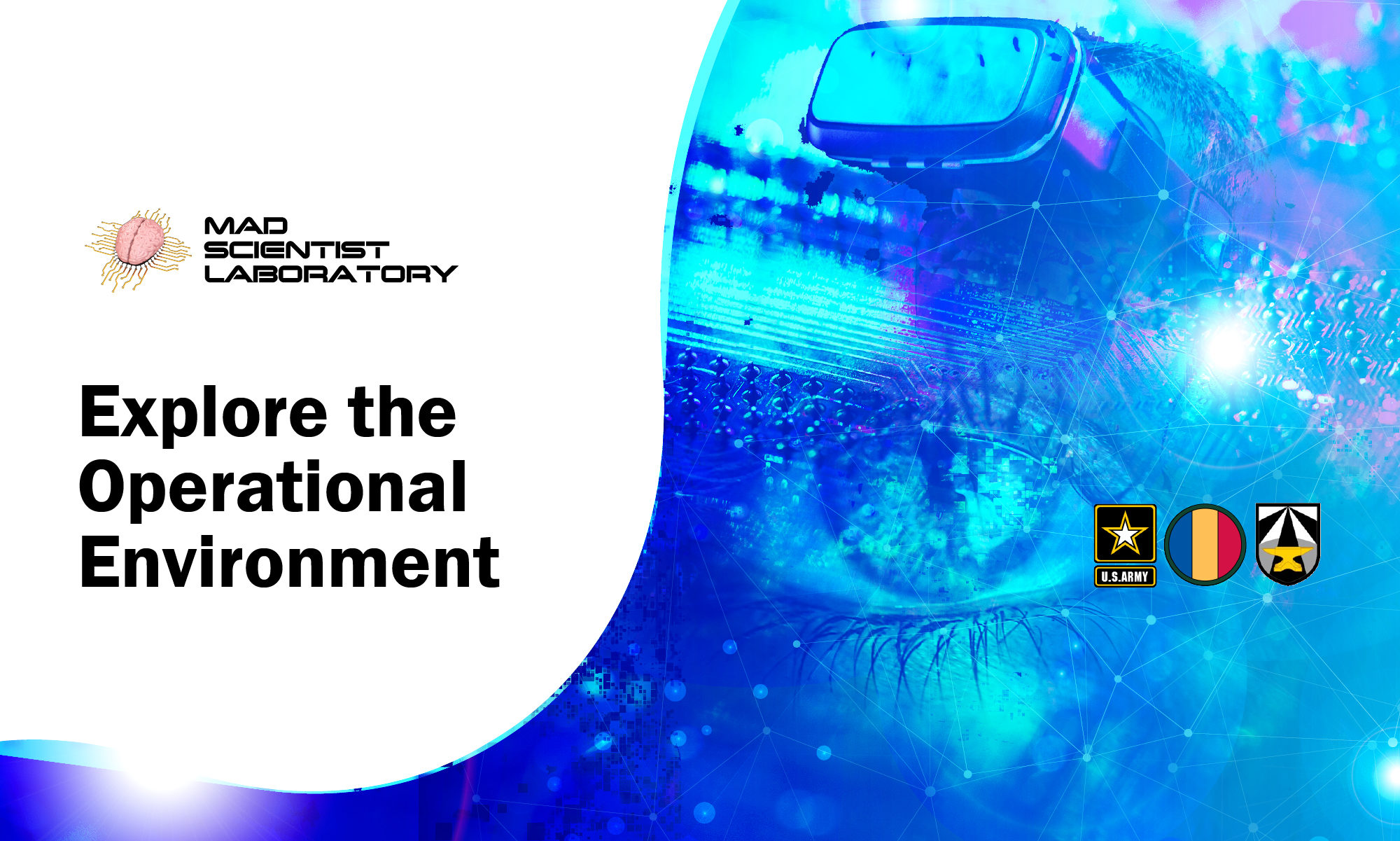
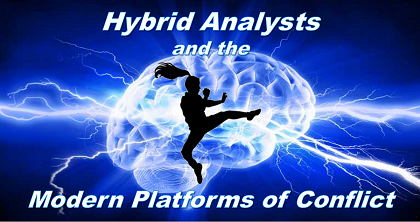


They teach “hybrid” in military intel schools…its called “PMESII-PT” (political, military, economic, societal, informational, infrastructure, physical terrain and time). “Cyber” is a cross dimensional piece of all the PMESII-PT variables with emphasis on Informational and Infrastructure, but the impacts are felt in societal, political (societal drivers of political change), economic (societal drivers on economic growth as well as political drivers on economic outgrowth), military…I could go on and on the cross leveling of dimensional “hybrid”…in simple terms, the “PT” part can be stated as ASCOPE (areas, structures, capabilities, organizations, people, and events)…the cross levelling between PMESII and ASCOPE gives the emphasis of reporting (meshing reporting, be it historical or current) against a country/people’s PMESII (organization structures be they physical or mental/philosophical/societal) which could be called “hybrid”; but is it still “hybrid” when its institutionalized in training and operational use? I say not. Just call it what it is NOW…Multi-Domain Operations (MDO) in a complex operational environment (COE).
Robert, I appreciate you reading, but I am not sure you completely caught the point of the article. Then again, I am not sure how much of your reply was tinged with sarcasm. What I have proposed is a structure of learning and course development bringing students from the basics of analysis to a master’s degree and above. I have found in my education in business strategy and cyber security that many of the same skills taught to military intel analysts can be brought to the public and some of the tools the private sector uses can be brought to bear in military studies. That is what my premise is, bringing skills out of silos until the student decides to specialize. In your example, that specialization might be the M(ilitary) in MEDIC.